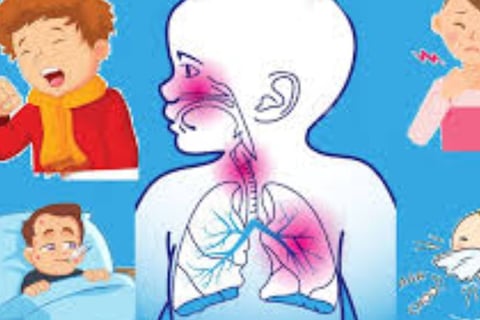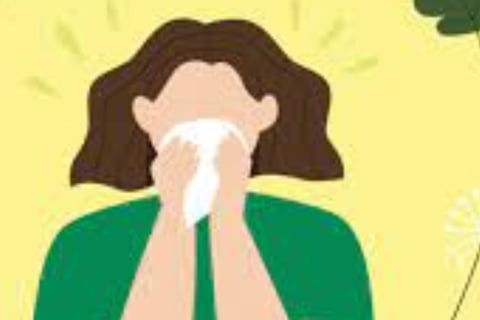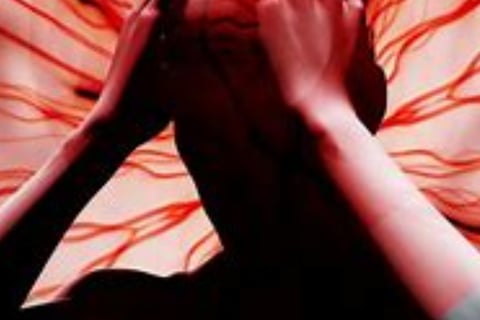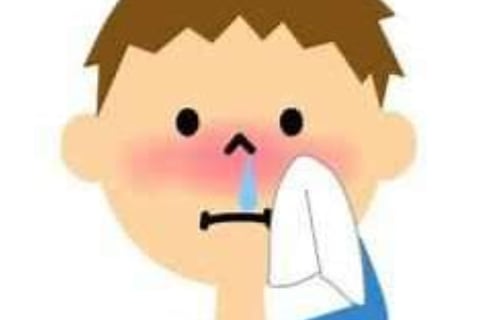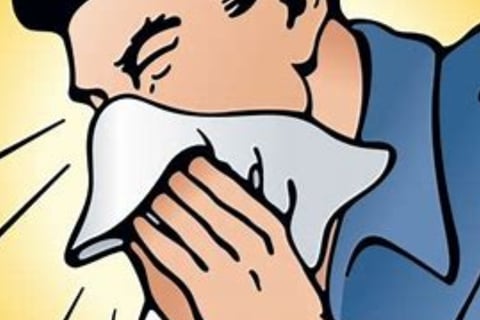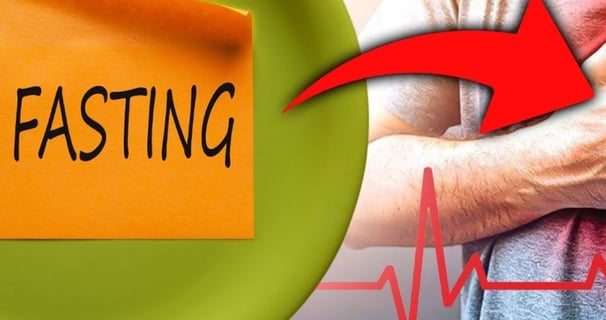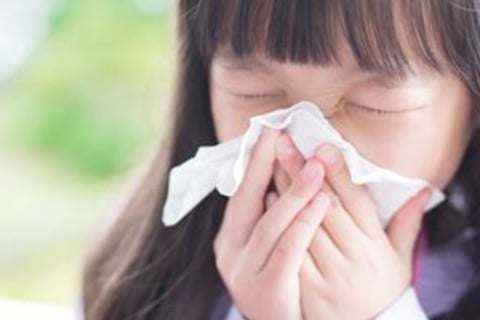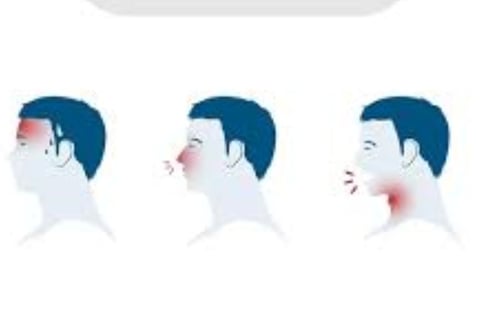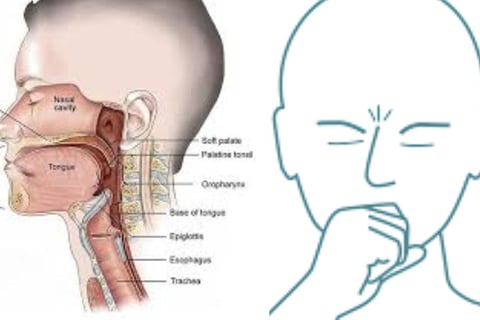
URTI : Dr Hassan Al Warraqi Way of Treating Infection
Explore Dr. Hassan Al Warraqi's holistic approach to treating URTI with fasting therapy, antimicrobial remedies, and natural healing methods. Learn about effective cleansing techniques for oral and...
GENERAL
Dr Hassan Al Warraqi
12/17/20249 min read


URTI : Dr Hassan Al Warraqi Way of Treating Infection
Upper Respiratory Tract Infection
which refers to infections affecting the upper part of the respiratory system, including the nose, throat, pharynx, larynx, and sometimes the sinuses.
These infections are commonly caused by viruses, though bacteria may also be responsible in some cases.
Common Examples of URTIs:
Common cold
Sinusitis (sinus infection)
Pharyngitis (sore throat, often caused by viruses or bacteria like Streptococcus)
Laryngitis (inflammation of the larynx)
Tonsillitis
Epiglottitis (rare but serious)
Variants
Throughout the pandemic, multiple variants emerged, including:
Original Wuhan strain
Alpha (B.1.1.7)
Beta (B.1.351)
Gamma (P.1)
Delta (B.1.617.2)
Omicron and its subvariants (B.1.1.529)
New Corona Variant XEC
Symptoms:
Cough
Runny or blocked nose
Sore throat
Sneezing
Fever
Hoarseness or voice changes
Headache
Mild body aches or fatigue
Treatment:
Most URTIs are viral and resolve on their own. Symptomatic relief might include:
Rest and hydration
Over-the-counter medications for fever, congestion, or pain (e.g., paracetamol, ibuprofen, decongestants)
Warm salt water gargles for sore throat
Steam inhalation for nasal congestion
If the infection is bacterial (e.g., strep throat), antibiotics may be necessary, but this should only be determined by a healthcare provider.
When to Seek Medical Attention:
High fever persisting for more than 3 days
Difficulty breathing
Severe sore throat with difficulty swallowing
Persistent or worsening symptoms after a week or only 3 days.
Signs of complications (e.g., ear pain, swelling, or severe headache)
Coronavirus (COVID-19) is caused by the virus SARS-CoV-2
a member of the coronavirus family. COVID-19 emerged in late 2019 and became a global pandemic.
Here's an overview:
Key Features of COVID-19 and related infections :
Transmission:
Spreads primarily through respiratory droplets when an infected person coughs, sneezes, or talks.
Also spreads via contact with contaminated surfaces, though less common.
Symptoms:
Range from mild to severe and appear 2–14 days after exposure.
Common symptoms:
Fever or chills
Cough
Shortness of breath
Fatigue
Muscle or body aches
Loss of taste or smell
Sore throat
Headache
Congestion or runny nose
Nausea or vomiting
Diarrhea
Severe symptoms:
Difficulty breathing
Chest pain or pressure
Confusion
Bluish lips or face
Risk Factors for Severe Disease:
Older adults
Individuals with underlying conditions (e.g., diabetes, heart disease, lung disease, obesity)
Immunocompromised individuals
Diagnosis:
PCR (Polymerase Chain Reaction) tests
Rapid antigen tests
Antibody tests
Clinical symptoms evaluation
Prevention:
Vaccination:
Multiple vaccines developed globally:
Pfizer-BioNTech
Moderna
Johnson & Johnson
AstraZeneca
Novavax
Various regional vaccines (Sputnik V, Sinopharm, etc.)
Hygiene Practices:
Regular handwashing with soap and water.
Use of hand sanitizers with at least 60% alcohol.
Mask Wearing:
Especially in crowded or poorly ventilated areas.
Social Distancing:
Maintaining a safe distance from others, especially during outbreaks.
Ventilation:
Improving airflow in indoor settings to reduce the spread.
Treatment:
Mild cases: Rest, hydration, fever reducers (paracetamol or ibuprofen).
Moderate to severe cases:
Antiviral medications (e.g., Paxlovid, Remdesivir).
Anti-inflammatory drugs (e.g., corticosteroids like dexamethasone for severe cases).
Oxygen therapy or ventilatory support for severe respiratory distress.
Long COVID:
Some individuals experience lingering symptoms weeks or months after recovery, such as:
Fatigue
Brain fog
Joint pain
Persistent cough
unexplained complaint
Dr Hassan Al Warraqi Way of Treating Virus Infection
Dr. Hassan Al Warraqi’s approach to treating viral infections, including conditions like COVID-19 and influenza, and all of its subnames ,emphasizes natural and holistic remedies centered on honey and fasting.
His methods are designed to boost the immune system and reduce inflammation through:
Honey: Known for its antimicrobial and anti-inflammatory properties, honey is used for treating sore throats, sinus infections, and even respiratory conditions. Dr. Al Warraqi often recommends gargling with honey or applying it topically for oral and nasal cleansing.
Fasting: He advocates fasting, including intermittent or Islamic fasting, to support the body’s natural healing by resting the digestive system, thereby enhancing immune function and reducing inflammation.
Cleansing Practices: His treatment regimen involves thorough cleansing of the mouth, nose, and sinuses. This includes gargling with honey and rinsing with saline to remove irritants and protect against infections.
Prevention and Holistic Care: Beyond treatment, Dr. Al Warraqi emphasizes lifestyle practices like maintaining hygiene, avoiding allergens, and using natural remedies to prevent recurring illnesses , such as sun exposure ,cold water therapy and exercise training ,
While his methods are rooted in traditional and natural healing principles, they are often proposed as complementary rather than replacements for modern medical treatments.
Ongoing Research
Variant tracking
Long-term health effects
Improved treatments
Vaccine development
Fasting effect on health
autophagy and fasting
stem cells and fasting
keywords
Fasting therapy,Cleansing methods (mouth, nose, sinuses),Gargling with honey,Natural healing,Antimicrobial properties,Anti-inflammatory remedies,Immune system boost,Sinus infections,Oral and nasal hygiene,Herbal remedies,Viral infections ,(COVID-19, influenza),Holistic care,Islamic fasting,Complementary medicine,
References
https://www.youtube.com/watch?v=LOW_3Xj9DHc
https://www.h-k-e-m.com/mucus-running-from-nose-to-throat-honey-and-fasting
Treating Infections with Dr. Hassan Al-Warraqi
Treating Viral Infections with Dr. Hassan Al-Warraqi
Comprehensive information about upper respiratory infections, including their symptoms, causes, and traditional and modern treatment methods.
The texts also discuss the Coronavirus (COVID-19) in detail, starting with its different strains and ending with methods of prevention and treatment,
with a focus on Dr. Hassan Al-Warraqi’s approach to treatment based on honey and fasting.
The information also includes a discussion of the long-term effects of COVID-19, in addition to ongoing research in this field.
What are the differences and similarities between the methods of treating upper respiratory infections and COVID-19?
Similarities and differences between the methods of treating upper respiratory infections and COVID-19:
Similarities:
●
The symptoms of both upper respiratory infections and COVID-19 are similar in some aspects, such as fever, cough, sore throat, headache, and nasal congestion.
●
In both cases, home remedies may include rest, fluid intake, and over-the-counter medications to reduce fever, relieve congestion, and pain.
●
Both conditions may require additional treatment, such as antibiotics for bacterial upper respiratory infections or antiviral medications for COVID-19.
●
In both cases, there can be complications that may require medical attention, such as difficulty breathing or persistent or worsening symptoms.
●
Dr. Hassan Al-Waraqi emphasizes the use of natural remedies such as honey and fasting in both cases to boost the immune system and reduce inflammation.
Differences:
●
Cause: Upper respiratory infections are often caused by viruses, but in some cases they can be caused by bacteria. COVID-19 is caused by the SARS-CoV-19 virus.
●
Severity of symptoms: Symptoms of upper respiratory infections are often mild to moderate. While COVID-19 symptoms can range from mild to severe and can lead to serious complications such as difficulty breathing.
●
Transmission routes: COVID-19 is mainly spread through respiratory droplets produced by coughing, sneezing and talking. While upper respiratory infections can be spread in several other ways in addition to droplets.
●
Medical treatment: COVID-19 may require the use of antiviral or anti-inflammatory medications or oxygen therapy in severe cases. While most upper respiratory infections are treated with rest and painkillers.
●
Prevention: There are vaccines available to prevent COVID-, while there are no vaccines to prevent most common upper respiratory infections.
●
Long-term complications: COVID-19 can cause long-term symptoms such as fatigue, exhaustion and brain fog. While upper respiratory infections usually do not cause long-term complications.
●
Dr. Al-Waraqi's treatment methods: Dr. Al-Waraqi focuses on using honey as a gargle or topical application to clean the mouth and nose in the treatment of both upper respiratory tract infections and Covid- .
He also stresses the importance of fasting to enhance the body's natural healing process and reduce inflammation in both cases.
●
Other methods of prevention: Dr. Al-Waraqi stresses the importance of exposure to sunlight, cold water therapy, and exercise as part of comprehensive prevention and treatment.
In short, although there are some similarities in symptoms and home treatments between upper respiratory tract infections and Covid-19, there are significant differences in the causes, severity, and treatment methods, in addition to the preventive measures specific to each. The focus remains on natural treatment methods as recommended by Dr. Al-Waraqi.
What are the methods of prevention of Covid-19 mentioned in the text?
The text mentions several ways to prevent COVID-19, including the following:
●
Vaccination: Multiple vaccines are being developed worldwide, such as the Pfizer-BioNTech, Moderna, Johnson & Johnson, AstraZeneca, and Novavax vaccines, in addition to various regional vaccines such as Sputnik V and Sinopharm.
●
Hygiene practices: Wash hands regularly with soap and water, and use hand sanitizers containing at least 60% alcohol.
●
Wearing masks: Especially in crowded or poorly ventilated places.
●
Social distancing: Maintaining a safe distance from others, especially during epidemics 2.
●
Ventilation: Improving airflow in closed spaces to reduce the spread of the virus.
In addition, Dr. Hassan Al-Waraqi suggests additional practices for comprehensive prevention and treatment, including:
●
Exposure to sunlight
●
Cold water therapy
●
Exercise training,Dr. Al-Waraqi also emphasizes the importance of honey for its antimicrobial and anti-inflammatory properties, and fasting to boost the immune system and reduce inflammation,
Therefore, the methods of preventing Covid-19 mentioned in the text include a set of health measures and vaccination, in addition to natural practices and recommendations from Dr. Hassan Al-Waraqi.
Frequently asked questions about respiratory infections, viral diseases and their treatment
What are upper respiratory tract infections (URTIs) and what are the common types?
Upper respiratory tract infections are infections that affect the upper parts of the respiratory tract, including the nose, throat, pharynx, larynx and sometimes the sinuses.
Common types include:
the common cold, sinusitis, pharyngitis (sore throat), laryngitis, tonsillitis and epiglottitis (rare but serious). Viruses are often the cause, but bacteria can cause them in some cases.
What are the common symptoms of upper respiratory tract infections and how are they treated?
Common symptoms include: cough, runny or blocked nose, sore throat, sneezing, fever, hoarseness or changes in voice, headache, and mild body aches or fatigue.
Most of these conditions are treated primarily with rest, fluids, and over-the-counter medications to relieve fever, congestion and pain, such as paracetamol, ibuprofen and decongestants.
Gargling with warm salt water can also be used for sore throats and inhaling steam to relieve nasal congestion.
For bacterial infections such as strep throat, antibiotics may be necessary, but this should be decided by a doctor.
What is coronavirus (COVID-19) and how does it spread?
Coronavirus (COVID-19) is a disease caused by the SARS-CoV-2 virus, a member of the coronavirus family.
It is primarily spread through respiratory droplets produced by coughing, sneezing, and talking of an infected person.
It can also be spread through contact with contaminated surfaces, although this is less common.
What are the symptoms of coronavirus (COVID-19) and how is it diagnosed?
Coronavirus symptoms range from mild to severe and appear 2-14 days after exposure.
Common symptoms include:
fever or chills, cough, shortness of breath, fatigue, muscle or body aches, loss of taste or smell, sore throat, headache, congestion or runny nose, nausea or vomiting, and diarrhea.
Severe symptoms include:
difficulty breathing, chest pain or pressure, confusion, and blue lips or face. Diagnosis is made by PCR testing, rapid antigen tests, antibody tests, and evaluation of clinical symptoms.
What are the methods of prevention of coronavirus (COVID-19)?
The methods of prevention of coronavirus include:
vaccination with the various vaccines available (such as Pfizer-BioNTech, Moderna, Johnson & Johnson, AstraZeneca, Novavax, and others).
In addition, personal hygiene should be practiced regularly, such as washing hands with soap and water and using hand sanitizers containing at least 60% alcohol.
It is also preferable to wear masks in crowded or poorly ventilated places, maintain social distancing, and improve ventilation in closed spaces.
What are the treatment options for coronavirus (COVID-19)?
Treatment options for mild cases include: rest, drinking fluids, and taking fever reducers (such as paracetamol or ibuprofen). Moderate to severe cases may require antiviral medications (such as Paxlovid or Remdesivir) and anti-inflammatory medications (such as corticosteroids such as dexamethasone in severe cases). Severe cases may require oxygen therapy or mechanical ventilation support.
What are the long-term symptoms of COVID-19?
Some individuals experience persistent symptoms for weeks or months after recovering from COVID-19. These symptoms include fatigue, brain fog, joint pain, persistent cough, and unexplained complaints.
How does Dr. Hassan Al-Waraqi treat viral infections?
Dr. Hassan Al-Waraqi focuses on natural and holistic treatments for viral infections, especially the use of honey and fasting.
He uses honey for its antimicrobial and anti-inflammatory properties, recommending gargling with it or using it topically to clean the mouth and nose.
He also advocates fasting, including intermittent or Islamic fasting, to support the body’s natural healing by resting the digestive system, thus enhancing immune function and reducing inflammation.
In addition, he emphasizes comprehensive oral, nasal, and sinus cleansing practices, emphasizing a healthy lifestyle, avoiding allergens, and using natural remedies to prevent recurring illnesses.
His treatment is complementary to modern medical treatments, not a substitute for them.
